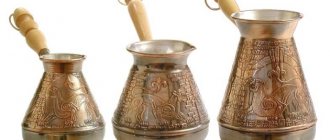Invention of instant coffee
The history of this drink began at the beginning of the 20th century in America. In fact, the idea of creating instant coffee belongs to the Japanese-American scientist Satori Kato , who invented the method for producing this product.
But practically it was George Constant Washington , an American entrepreneur and inventor who lived for some time in Guatemala and was engaged in agriculture, who invented the technology for producing instant coffee on an industrial scale. Upon returning to America in 1909, Washington founded his own business and launched Red E Coffee, the first commercially produced instant coffee. Washington's company subsequently became the main supplier of coffee to the American Army during and after World War I. But despite the success of the business, the quality and unpleasant taste of early instant coffee were noted.
More extensive research into creating instant coffee as we know it today began in the 1930s in Brazil, which was (and remains to this day) the world's largest producer and importer of coffee. The problem was that for several years Brazil had been faced with an overproduction of green coffee. After drying and initial processing, millions of bags of coffee beans remained unclaimed, and it was very difficult to store them for a long time. Therefore, the Brazilian government decided to turn to the Swiss leadership with a request to help solve the problem of surplus coffee crops.
Max Morgenthaler at Nestlé, was tasked with creating a way to preserve and process coffee beans. After four years of scientific research and practical testing, Nestle decided to stop the experiment and closed the project. But Morgenthaler did not give up, continuing to work on creating a “coffee cube” technology that would withstand long-term storage and turn into a drink after adding hot water, while maintaining the properties of the coffee beans.
In his free time after work, Morgenthaler, purchasing coffee with his own funds, continued to create instant coffee. Two years later, in 1936, Morgenthaler was finally able to capture the aroma of coffee, which had previously been lost during the processing of beans, and transfer it to the final product.
As a result, in 1938, in industrial conditions, soluble coffee powder was first produced, called “Nescafé” , and subsequently became incredibly popular throughout the world.
Rating of 20 brands of good instant coffee
It is necessary to consider all the qualitative characteristics of each variety when choosing.
Let us consider in more detail in the rating list each brand that has a soluble product in its production.
Carte Noire
This coffee is very popular among lovers of this drink. It has the tart smell of real coffee, dissolves well and has no foreign aftertaste. Among other things, Carte Noire has excellent taste. It is strong enough, so 2/3 of a teaspoon is enough for a mug, which makes its consumption economical.
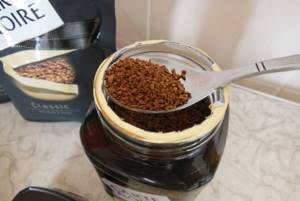
Has a tart smell of coffee without foreign impurities
The downside is the rather high price, but according to coffee lovers, it’s worth it. The cost varies from 390 to 640 rubles. This brand is a winner at many exhibitions.
Egoiste Noire
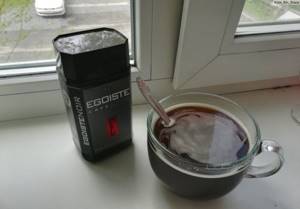
This brand of coffee is also very popular. The average price is 700 rubles. In addition to the pleasant taste, this product has a slight sourness, which makes the drink unusual. They also emit a strong aroma. This coffee has a special feature: inside the capsules there is ground grain. Because of this, sediment remains at the bottom of the mug.
Bushido Original sublimated
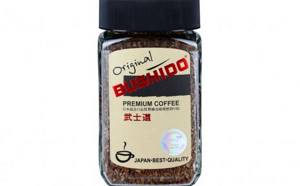
This is a classic coffee with a standard taste. The drink has a strong aroma of freshly brewed coffee. The peculiarity of this brand is that even if you drink it with milk, the smell and taste do not decrease, as often happens. The drink itself has a chocolate flavor. You can buy Bushido for about 650 rubles.
Jacobs Millicano
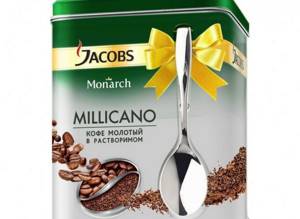
This brand, like Egoiste Noire, has ground beans in a soluble shell. It has a rich, soft and not bitter taste, brews quickly, leaving behind a small sediment. This brand is very popular because it has a low cost and good quality product. The price of this product ranges from 390 to 410 rubles. This brand participated in the AgroRus exhibition in 2018.
Jardin Colombia Medellin
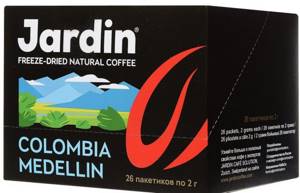
Price - about 300 rubles. Coffee has a rich taste and does not lose it when adding cream or sugar. However, this coffee may be too strong for some. Even if you add just one spoon of powder, the finished drink will be very strong. This is worth paying attention to for those who do not like bitter coffee. They also note that this particular brand invigorates better than others.
UCC
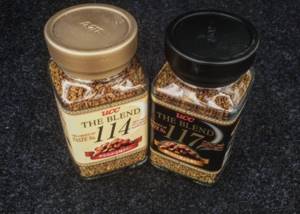
This brand is difficult to find on the shelves of Russian stores, but it is freely available in online stores. The taste is soft and pleasant. There is no acid or bitterness. The granules are medium, very neat. The coffee has a strong aroma, with notes of nuts. This is an excellent choice for those who love coffee with a creamy flavor. Price - from 300 rubles.
Moscow coffee shop on shares
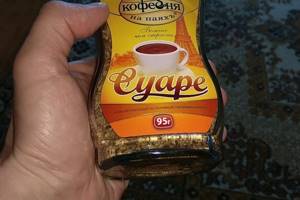
Average price - 300 rubles per 95 grams. The peculiarity of this brand is the shape of the granules. They have a long, elongated shape and are quite large in size. But despite this, the granules dissolve well and leave no sediment. The coffee has a classic taste and pleasant aroma.
Taster's Choice

This coffee is produced by a plant in South Korea. It is profitable to buy: 0.5 kg costs about 700 rubles. The finished drink has a soft and delicate taste and is very invigorating. This coffee is suitable for those who do not like bitter and strong drinks. It also has a pleasant coffee bean scent.
Moccona
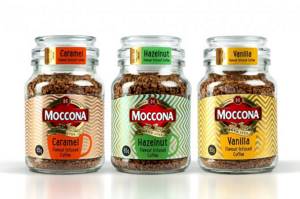
The cost ranges from 200 to 350 rubles. This coffee has a mild but rich taste. Thanks to this, it is used sparingly. The strength level on the packaging is 3 out of 5. According to customer reviews, this coffee is best drunk with sugar and cream. Without additives, it has a strong bitterness, which not everyone may like. A weak aroma is also noted.
Jacobs Monarch
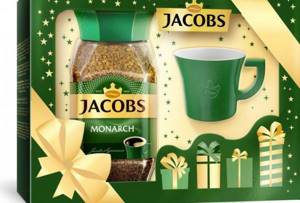
Approximate cost: 350 rubles. This brand has smooth, almost identical granules. The taste of coffee is classic, without pronounced bitterness or aftertaste. The powder dissolves well in water and leaves no sediment. The smell is strong and dissipates quickly.
Jockey
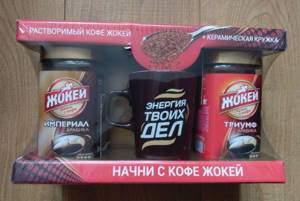
The cost ranges from 100 to 200. This brand is quite popular, despite the fact that the coffee itself has recently appeared on the market. The finished drink has a tart taste, very strong, with hints of acid. This coffee is quite strong, so it is better to dilute it with milk, cream or sugar.
Tchibo Exclusive
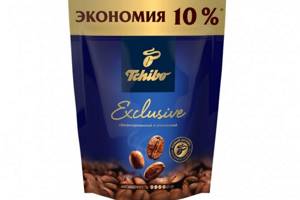
this brand is affordable: 100 grams will cost only 250 rubles. The coffee has a pleasant aroma, the granules are light and smooth. The drink has a mild taste without pronounced bitterness. There is sourness. It dissolves well and leaves no sediment. Tchibo, despite its budget price, is not inferior in quality to luxury.
Davidoff
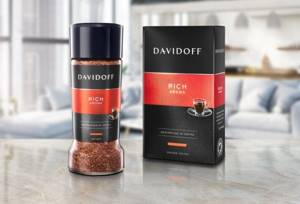
This coffee is very strong, has a strong smell and is bitter. Espresso lovers love it. It is consumed slowly - one spoon is enough for a large mug. For those who don’t like very strong coffee, half is enough. Among the features, one can highlight the unusual design - the shape of the can differs from the rest. This drink from Davidoff goes very well with milk and sugar and does not lose its smell or taste when mixed. The price is average - about 350 rubles per 100 grams.
Instant Nescafe Classic
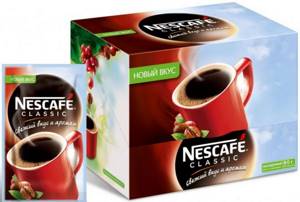
This brand is one of the most popular, not only due to its original advertisements. It is one of the oldest and has a rich brand history. Nescafe is very popular among students due to its low price and energizing properties. Costs no more than 120 rubles.
It is granular and dissolves well. The finished drink has a sour taste and goes well with milk or cream. As customers say, it is better to drink this coffee hot, as some flavor characteristics are lost when cooled.
The most famous brand is Maccoffee Gold
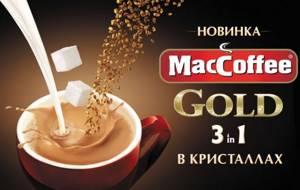
This brand is known to many people thanks to its famous 3 in 1 coffee bags. However, they also have a classic option - granulated coffee without additives. The product has a low price - approximately 100 rubles per 100 grams. Does not leave sediment, goes well with milk and sugar. It has a slight bitterness and is not sour. Use sparingly - 1-1.5 spoons per mug.
Black card
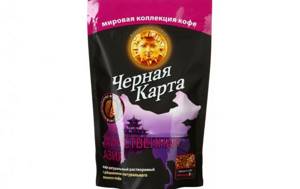
This is a fairly budget option - 200 rubles per 95 grams. The drink is strong and invigorating. It has a pleasant taste, dissolves well and leaves no sediment. Combines with milk and sugar without losing its quality. The smell is weak, unobtrusive. Based on reviews, we can say that the Black Card tastes as close as possible to natural coffee. The granules are not overcooked, neat in shape and do not crumble. The drink has a slight sour taste, but is not bitter at all.
Le Cafe Mocca
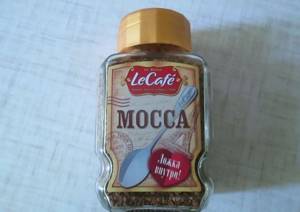
This brand pleases with little surprises - each can of coffee contains a teaspoon. The granules are light, medium roast, and may crumble. The taste is standard, without strong bitterness or strong acid. Overcooked pellets may occur, but this is rare. The coffee creates a little foam. The crystals dissolve well and leave no sediment. The price is quite reasonable - about 160 rubles. The drink is quite strong and invigorates well.
The quality of Nescafe Gold is undeniable
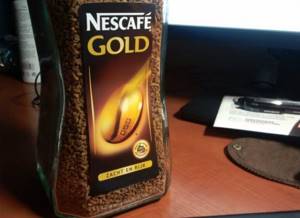
One of the most popular among instant coffee. Cost - 300-350 rubles per 190 grams. The granules are medium grind, have a slight odor and a normal taste. Quite invigorating, medium strength, no aftertaste. Goes well with milk and cream, but may lose flavor.
Elite variety - Ambassador
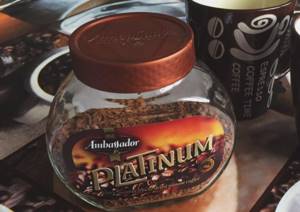
Not a very popular brand. The average cost is 300 rubles. The granules are light, very neat, the same size, and do not crumble inside the jar. The smell is very pleasant, but rather weak. The Ambassador coffee itself is not strong. To achieve a bright taste, you will need more than one spoon. However, this is an excellent option for those who do not like bitterness and excessive strength. The drink has an acidic taste characteristic of Arabica and forms a light foam.
Milagro
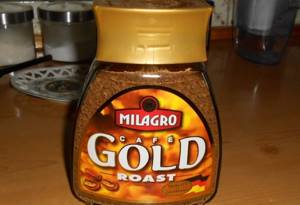
This coffee has a mild taste and belongs to the budget segment. The packaging is beautiful: the unusual shape of the jar and the gold-colored lid. The crystals are light brown in color, approximately the same shape, and do not crumble or break in the jar. The cost is about 400 rubles.
Methods for producing instant coffee
The whole essence of making instant coffee comes down to the following technological processes:
- Roasting green coffee beans;
- Grinding roasted coffee;
- Treatment of ground coffee with hot water, or extraction, i.e. brewing coffee.
These stages of the technological process are similar to how coffee is prepared at home, only this happens on an industrial scale. Next, the resulting coffee extract is filtered, separated from the grounds, and dried. That is, the last stage of the technological process is drying, which determines the type of instant coffee obtained. Thus, it can be of the following types:
- powder _ This coffee is produced using spray dry technology, “spray drying”. The coffee extract is sprayed into a stream of very hot air and dries into a powder;
- granular _ This type of coffee is produced from powdered coffee, which is made by spray drying, adding another step to the technological process - aggregation, which, in essence, is the wetting of coffee powder to form granules. Such granules then, during storage of the finished product, can again disintegrate and turn into powder;
- freeze-dried . This coffee is produced using freeze dry technology, “freeze drying”. The coffee extract is frozen, then crushed into small crystals, and then dehydrated by sublimation in a vacuum. After the water evaporates, the dry extract retains its crystal form, acquiring a caramel color.
This manufacturing method best preserves the flavor and aromatic substances of the coffee extract, but due to the fact that this technology is the most energy- and labor-intensive, freeze-dried instant coffee is more expensive than powdered and granulated coffee.
Nescafe
The production location is Krasnodar region, but the Nescafe brand belongs to a Swiss company. The quality of this product is without a doubt high.
The modern assortment is represented by all types of instant coffee: powdered, freeze-dried and granulated. The main raw material for the production of these drinks is Arabica beans.
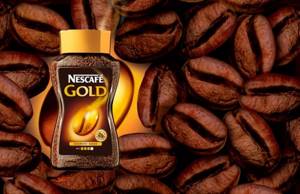
A characteristic feature of Nescafe is its pronounced aftertaste. When you take a sip of this drink, you will feel the rich sourness. The bright and rich taste results from the high caffeine content of 4%.
The granules of the drink are light and uniform. Its aroma is expressive. Some people may find Nescafe to be too bitter. This coffee dissolves well without sediment.
The average price is 350 rubles.
Raw materials for the production of instant coffee
Each manufacturer of this product, through advertising, convinces its consumers that only Arabica beans of the highest quality are used to produce instant coffee. But the reality is that if this were true, then the price of instant coffee would be many times higher than that of beans. The price for 100 g of instant coffee is already higher than the cost of the same amount of beans due to the use of energy-intensive processes to produce a soluble analogue of natural coffee. In addition, due to the peculiarities of the technological process for making instant coffee, most of the aromatic and flavoring substances of coffee beans are lost in the process. Thus, using high-quality beans to produce ersatz coffee is not economically profitable.
It is also worth considering the fact that high-grade Arabica beans are bought by roasting companies that produce natural bean coffee. For the production of instant coffee, coffee beans are mainly used that remain unclaimed in the natural coffee market: they have not been sorted for defects, do not have a unique or simply good flavor potential (mediocre grain), sometimes even affected by disease (mold, fungi) or simply beans obtained from unripe coffee berries.
Another source of raw material for the production of instant coffee is robusta . The beans of this type of coffee do not have such a bright taste and aroma as Arabica, but Robusta contains more caffeine, which is even an advantage in cases where a person wants to get not so much taste from a cup of coffee (it can be “masked” with milk or sugar, if it is unpleasant), how much is just a charge of cheerfulness. In addition, Robusta is quite unpretentious in cultivation, which allows you to grow this type of coffee without special costs, unlike Arabica, which ultimately can have a positive effect on the price of the finished product, to which Robusta was added.
Despite some shortcomings, instant coffee has long conquered the market and enjoys well-deserved popularity among consumers. Let the aromatic drink delight you every morning!
The best choice
Jardine, Nescafe, Jacobs, Black Card are the names of popular coffee brands. There are elite and mass ones among them. The first ones are much more expensive and of better quality, the second ones are more budget-friendly.
60% of Russian gourmets believe that the best instant coffee is Bushido. It is produced in Switzerland and labeled in Japan.
This drink is made only from Arabica beans grown in Central America. Distinctive features of Bushido are the bright black-brown shade of the granules, rich smell and taste with coffee and chocolate notes.
There is no sediment left after brewing, which is a huge plus. But Bushido also has a drawback - the price. For 100 grams of such a product you will have to pay at least 1000 rubles.
Of course, it is impossible to accurately name the best coffee brand. People say: “How many people - so many opinions.” However, it is possible to distinguish a high-quality drink from a low-quality one. But if you don’t know which instant coffee to choose, it is recommended that you read the rating.
How to choose instant coffee
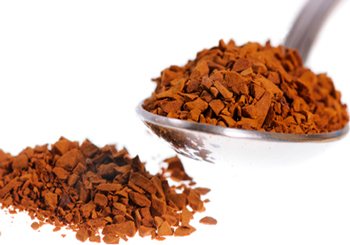
How to choose instant coffee? This is a really difficult question, because you want the drink to be not only easy to prepare, but also to have high flavor and aroma characteristics. Some particularly picky gourmets will say that instant coffee, by definition, cannot be good. Let's answer this way - depending on what you compare it with. Of course, a drink prepared in half a minute by dissolving coffee powder in hot water is unlikely to compete with a drink brewed from freshly ground beans. However, in a wide range of instant products you can find truly worthy options. The main thing is to know how to look. So which instant coffee should you choose?
To understand how to choose a good instant coffee, you need to pay attention to some features of this product. The quality, and therefore the flavor, of coffee directly depends on the two most important factors, such as the type of coffee used and the production method (drying method).
How to choose instant coffee based on the variety?
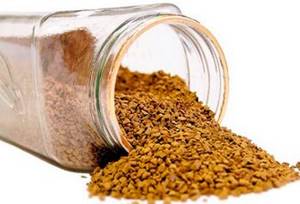
Depending on the type of coffee bean used to create instant coffee, there are three types of product:
the first type, consisting exclusively of Arabica beans, is the best and most expensive option for instant coffee; the second type consists of a mixture of Arabica and Robusta; the third type is the cheapest option, consisting only of robusta beans.
Note that the quality of the product largely depends not only on the type of coffee used, but also on such components as the region where the coffee tree grows, the climate characteristics of the region, as well as the degree of roasting and grinding of the beans.
How to choose instant coffee based on production method?
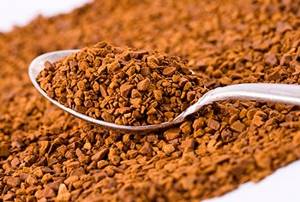
Depending on the technology of drying coffee fruits, there are three popular types of instant coffee:
Powdered (emulsified) coffee is a product produced by atomizing coffee extract under hot air pressure. Externally, this coffee looks like a fine powder; it is considered the cheapest option on the market. Accordingly, we do not recommend buying a powdered product for gourmets who are trying to understand how to choose a good instant coffee.
Granulated (agglomerated) coffee is a product produced by soaking coffee in special solutions to form porous granules. You can recognize such a product by lumps of various sizes and shapes with a porous structure.
Freeze-dried (frozen) coffee is a product produced using the so-called freeze-drying technology, during which ground beans are dehydrated in a vacuum at a very low temperature until crystals form. This technology is considered the most effective and expensive, so freeze-dried coffee is the most expensive and high-quality product in the instant coffee category.
Knowledge of the above processes will help the buyer make the right choice. Buying instant coffee, like any other food product, requires special attention. Therefore, we propose to summarize all the data and make a list of the main rules on which instant coffee to choose:
1. In no case should a quality product contain any other ingredients other than coffee beans. We do not recommend purchasing products containing artificial colors, flavors, flavor enhancers, etc.
2. A conscious consumer will certainly prefer freeze-dried coffee to other types of product. It is important to remember here that the coffee crystals should not stick together, but have sharp corners and a solid structure. All coffee granules should be colored a pleasant chocolate shade. If the coffee particles are too dark, then refrain from purchasing, as, most likely, over-roasted beans were used in production.
3. The rate of dissolution of a product in water is an important indicator of its quality. Thus, good instant coffee must live up to its name and dissolve completely (without the formation of sediment) even in cold water in three minutes, and in hot water in 30 seconds. Unfortunately, you can only test coffee in this way after making a purchase.
4. As for the caffeine content, the norm for instant coffee is 3-4%, however, according to the law, the manufacturer is not required to indicate the percentage of caffeine on the packaging.
5. The nature and quality of packaging play a significant role in the choice of instant coffee. The most popular packaging options today are glass, metal cans and soft bags. So which instant coffee should you choose? The highest quality products are packaged in glass and metal containers, and cheap types are packaged in vacuum foil bags. When purchasing coffee in a tin, make sure there is no rust on it, and if you prefer coffee in a glass container, inspect it for chips and cracks. By the way, a transparent glass jar, unlike bags and metal containers, provides the buyer with an excellent opportunity to examine the product directly at the store counter. This way you see what you are paying money for. Seemingly little things like print quality, clarity of letters and the GOST icon on coffee packaging will help you choose a worthy product. Don’t forget about the shelf life; don’t buy stale coffee. In short, good packaging is the key to high quality instant coffee.
6. When considering the question - how to choose instant coffee? — it’s worth paying special attention to its price. To produce a quality product, expensive methods and selected raw materials are used, and 1 kilogram of instant coffee requires about 2 kilograms of fresh beans, so good coffee cannot be cheap. As you know, free cheese is only in a mousetrap, so we strongly recommend that you do not buy products at a suspiciously low price.
We wish you profitable shopping and delicious coffee!
The most popular products in the category - Coffee beans
Lavazza coffee beans Qualita Oro 1 kg 1382 rub.
| Paulig Arabica coffee beans 1 kg 676 rub. | Santo Domingo coffee beans Puro Cafe 454 g 900 rub. | Hausbrandt Espresso coffee beans 1 kg 2085 rub. | Goppion Caffe coffee beans JBM 1 kg 3265 rub. |
| Diemme coffee beans Miscela Excellent 1 kg 3504 rub. |
The most popular products in the category - Ground coffee
| Lavazza ground coffee Oro 250 g 377 rub. | Paulig Espresso Originale ground coffee 250 g 150 rub. | Dallmayr ground coffee Prodomo 250 g 350 rub. | Ground coffee Me Trang Arabica 250 g 404 rub. | Hausbrandt ground coffee Espresso 250 g 681 rub. |
| Goppion Caffe ground coffee JBM (JaBlMo) 250 g 965 rub. |
Ninth place - Dutch MOCCONA
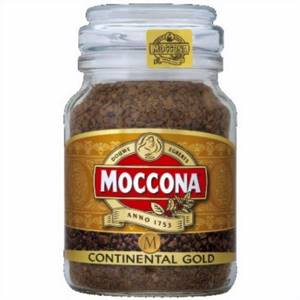
A representative from the Netherlands is in ninth place in our ranking. In Holland, Moccona is the best coffee, according to local residents. And in 1990, it was first introduced to the Russian market and immediately fell in love with our compatriots. A distinctive detail of this product is its recognizable cylindrical shape of the can, as well as the excellent European quality of the drink. It is presented on store shelves in three variations of different roasts, which will appeal to true coffee connoisseurs.
Its granules are dark brown in color and large in size. They also have a medium strength, with a bitter aftertaste.
The price for 100g of instant drink from MOCCONA is 270 rubles.











